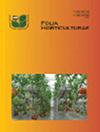盐胁迫下叶面施碘对番茄生长、矿物质和抗氧化剂的影响
IF 2.2
4区 农林科学
Q2 HORTICULTURE
引用次数: 7
摘要
摘要植物生物刺激剂已被用于减少不同类型的生物和非生物胁迫造成的损害。碘(I)是植物中的非必需元素。尽管如此,它被认为是有益的,也是一种生物刺激剂,因为外源性应用可以增强氧化还原代谢,从而提高抗氧化剂、与必需矿物质的协同作用,并提高对不利因素的耐受性。然而,人们对碘的作用机制知之甚少;因此,进行研究阐明这种元素对植物生理学的影响是有利的,这有望鼓励生产性农业部门使用这种元素,并带来额外的生物强化效益。本研究的目的是评估每15天在100μM下叶面施用KIO3对在盐度胁迫(100mM NaCl)的温室条件下生长的番茄植株的生长、矿物质含量和抗氧化剂的影响。结果表明,碘并没有减轻盐度对新鲜或干燥生物量的不利影响,但能使果实产量增加23%。在叶片中也发现了大量的N和Fe,但在果实中没有发现;同样的情况也发生在碘浓度上,处理植物的叶片中碘浓度很高,但番茄果实中碘浓度不高。碘处理降低了果实中钙和镁的含量,降低了GPX、番茄红素的活性和抗氧化能力。无论是否施用碘,果实质量变量都不受盐度的影响。本文章由计算机程序翻译,如有差异,请以英文原文为准。
Outcomes of foliar iodine application on growth, minerals and antioxidants in tomato plants under salt stress
Abstract Plant biostimulants have been used to reduce the damage caused by different types of biotic and abiotic stresses. Iodine (I) is a non-essential element in plants. Still, it is considered beneficial and a biostimulant, since exogenous application can enhance the redox metabolism, which improves antioxidants, synergies with essential minerals and increases tolerance to adverse factors. However, little is known about the mechanism of action of iodine; so, it is advantageous to undertake research that elucidates the impact of this element on plant physiology, which is expected to encourage the productive agricultural sector to use this element with additional biofortification benefit. The objective of this research was to evaluate the effect of foliar KIO3 applications every 15 days at 100 μM, on growth, mineral content and antioxidants in tomato plants grown under greenhouse conditions subjected to salinity stress (100 mM NaCl). The results showed that iodine did not mitigate the adverse impact of salinity on fresh or dry biomass but increased fruit production by 23%. A greater amount of N and Fe was also found in the leaves but not in the fruits; the same happened with the iodine concentration, which was high in the leaves of the treated plants but not in tomato fruits. The content of Ca and Mg in fruits was decreased in plants treated with iodine, as well as the activity of the GPX, lycopene and the antioxidant potential. None of the fruit quality variables were affected by salinity with or without application of iodine.
求助全文
通过发布文献求助,成功后即可免费获取论文全文。
去求助
来源期刊

Folia Horticulturae
Agricultural and Biological Sciences-Horticulture
CiteScore
3.40
自引率
0.00%
发文量
13
审稿时长
16 weeks
期刊介绍:
Folia Horticulturae is an international, scientific journal published in English. It covers a broad research spectrum of aspects related to horticultural science that are of interest to a wide scientific community and have an impact on progress in both basic and applied research carried out with the use of horticultural crops and their products. The journal’s aim is to disseminate recent findings and serve as a forum for presenting views as well as for discussing important problems and prospects of modern horticulture, particularly in relation to sustainable production of high yield and quality of horticultural products, including their impact on human health.
 求助内容:
求助内容: 应助结果提醒方式:
应助结果提醒方式:


